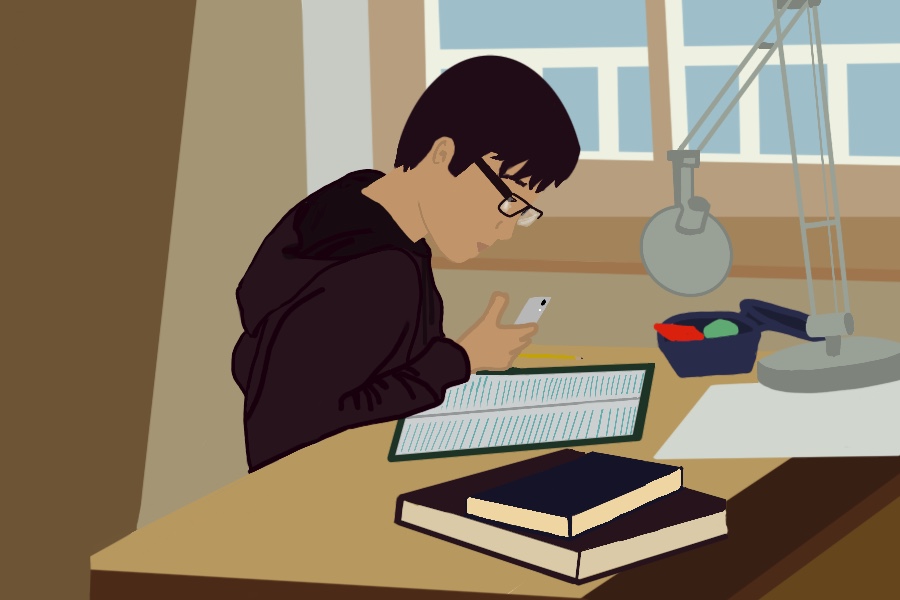Online midterms raise integrity, accessibility concerns; some canceled altogether
File illustration by Catherine Buchaniec
Some Northwestern professors are adjusting final exams to accomodate for remote learning.
May 22, 2020
Professors have adapted to the remote quarter by using various software to administer midterm exams or, in some cases, have canceled traditional midterms outright.
The shift has raised concerns about academic integrity and accessibility. Some professors have begun using LockDown Browser, a software designed for taking online examinations. The program shuts down all other applications and may sometimes require webcam access to monitor and record students while they are taking their tests.
Weinberg freshman Victoria said the self-recording aspect of the software makes her feel anxious while taking exams.
“If I look down at my work too long the camera would start flashing and say, ‘Oh, restart, look at the camera and reset to make sure you’re not cheating,’ which was weird,” she said.
Despite the fact that her tests are to be completed by hand, LockDown Browser requires her to look up from time to time, which distracts her while doing longer exam questions, Victoria said.
She said she planned ahead of her statistics exam, which uses LockDown Browser and must be taken synchronously, to take the exam at her mother’s office, where the WiFi connection is more stable.
“Sometimes (my connection) will glitch when I’m on Zoom and I have to leave the class and restart. Obviously in an online exam, that’s not going to work,” Victoria said.
Khantey Lim, a McCormick freshman living in Cambodia, said this quarter’s exams were concerning because she wasn’t able to access office hours due to the time difference.
Lim, who had little experience with coding before attending Northwestern, has resorted to chains of over 10 different emails with her TA to better prepare herself for her exams for her engineering analysis course. The experience has differed from the engineering class she took previously.
“It’s a bit unfair, because (students in the United States) can just attend several office hours,” Lim said. “For (Engineering 205: Engineering Analysis 1), I went with my friends and we could share coding stuff and we’d go through it together.”
For other international students like McCormick freshman Atishay Saraogi, synchronous midterms mean staying up until 2 a.m. to take tests. Saraogi, who currently lives in New Delhi, India, says it feels weird to be taking an exam while everyone in the house is asleep.
Though his linguistics class uses a system where he can download and fill a Microsoft Word document, Saraogi needs to be awake past midnight to complete both this test and his engineering analysis tests.
“It’s just harder to be productive and mentally in an exam-taking mode,” Saraogi said.
Political Science Prof. Michael Loriaux decided to cancel both the midterm and final examinations for his introductory international relations course. He cited the fact that his students are located across 14 time zones as his main reason for doing so.
In addition, Loriaux said take-home exams put a “one-time pressure on students who are in a dozens of different personal situations” and opted instead to give five weekly essays to his students.
“I like this formula, I might keep it,” Loriaux said. “It’s not a bad exercise to take all this material and think about what you learned for this week, think it through and get something out of it.”
Loriaux said that he was lucky to have the ability to give grades in this fashion because in some ways his class is the “opposite” of a course like statistics. If he were teaching such a course this quarter, Loriaux said he would have to find a way to administer exams and address integrity questions that come with them.
For Saraogi, quizzes during COVID-19 designed to be taken open-note make more sense than traditional exams. Everyone is dealing with different situations in different places, Saraogi said, which might make it hard to enforce academic integrity.
“There’s so much going on in the world that I feel like even if a couple kids cheat it’s not the end of the world,” Victoria said. “Why make everything harder for everybody else? The people that are cheating are just cheating themselves.”
Editor’s note: The last name of a student has been removed due to concerns that the information she shared about her mental health might inhibit her professionally.
Email: [email protected]
Twitter: @anushuyathapa
Related Stories:
— CTEC responses this quarter will assess remote learning, won’t be public
— As remote learning continues, student startup looks to connect tutors to students


